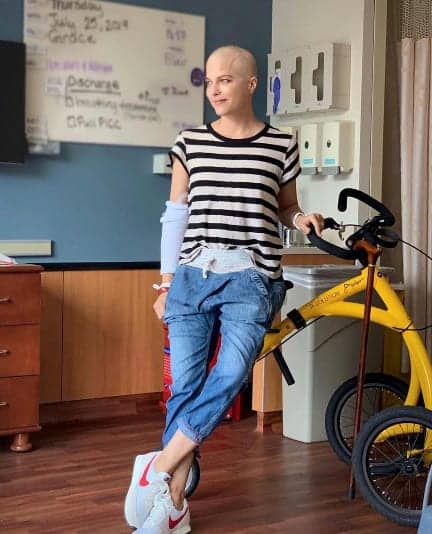photo caption: Actress Selma Blair, who has battled multiple sclerosis (MS), poses with an Alinker “walking bike,” a mobility device for people with disabilities, in an unknown location in this undated handout photo. Courtesy of BARBARA ALINK/ALINKER/Handout via REUTERS
WEYMOUTH, Mass. (Reuters) – Lindsey Main from Massachusetts was an active woman who enjoyed yoga, running and walking her dog, until she suffered a stroke in January 2018 and lost mobility.
While starting the long, slow process of exercise and rehabilitation she spotted actress Selma Blair announcing on Instagram she had the nervous system-damaging disease multiple sclerosis.
The 47-year-old star of films including “Cruel Intentions” and “The Sweetest Thing” posted images of herself using an Alinker mobility bike. The two began private messaging and Blair bought Main one of the bikes. Main says it has changed her life.
Now she can walk her dog again, go to the shops and dance on it.
“I think movement actually is the best medicine. It’s like that saying: ‘If you don’t use it, you lose it’,” Main said.
The bike was created by Dutch designer and humanitarian Barbara Alink, who made it initially as a mobility device for her ageing mother to use without the stigma attached to mobility walkers and scooters.
A successful crowdfunding campaign in 2014 brought about a launch in the Dutch market and a North America launch followed in 2016. Now the bike, which costs $1,977.00 ships worldwide.
“The Alinker is for everybody who identifies as an active person and happens to have a diagnosis,” said Alink.
“The feedback that I’m getting from people is that their life has changed, they can go out again, they have agency back,” she added.
The Alinker has three wheels and riders support themselves on a saddle and move their legs to push it forward. It has brakes and the high saddle means users can sit almost at standing height and speak to others at their eye level.
It is used by people with Parkinson’s, arthritis, cerebral palsy, spinal cord injuries, muscular dystrophy and peripheral neuropathy along with those recovering from strokes and surgery.
“Isolation is a bigger disease or a bigger burden on people than the actual symptoms of the disease itself,” said Alink.
“So with the Alinker, being engaged in life again because you can go out… your radius expands again,” she added.
Alinker is not classed as a medical device, so many insurance companies do not fund its purchase, leaving people to rely on crowdfunding or using the company’s rent-to-own scheme.
At its factory in Taipei in Taiwan, the company is working on prototypes for smaller Alinkers for children.
[Source: Reuters]





